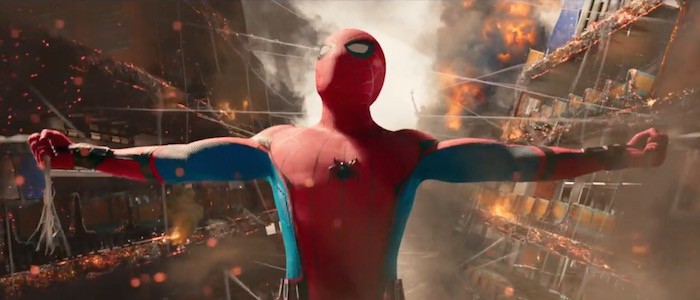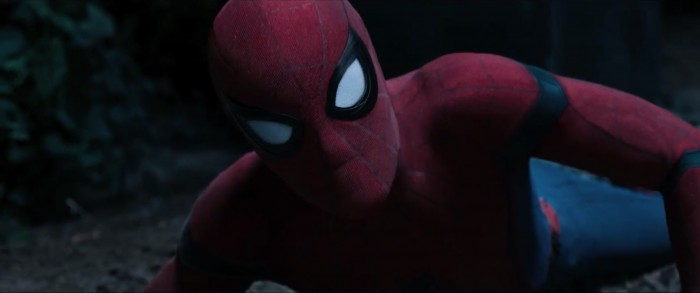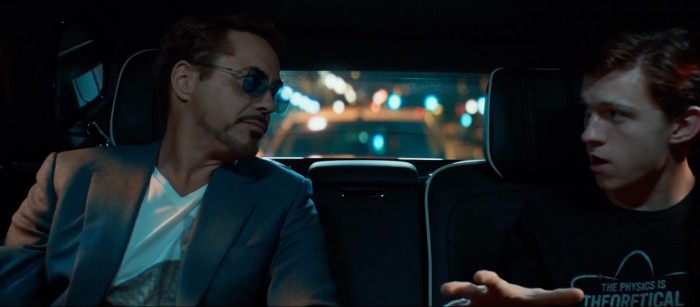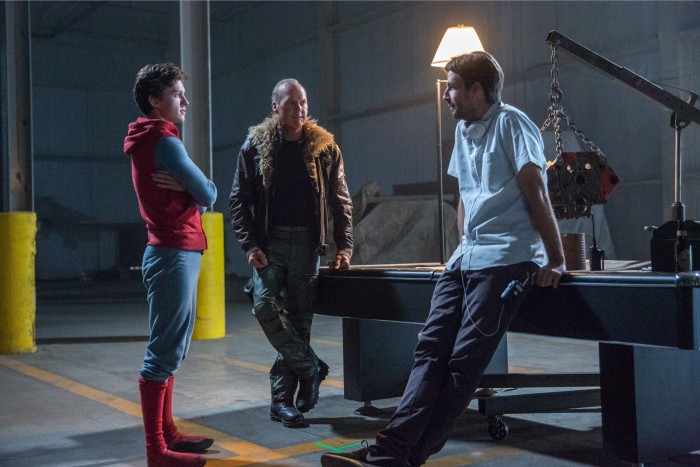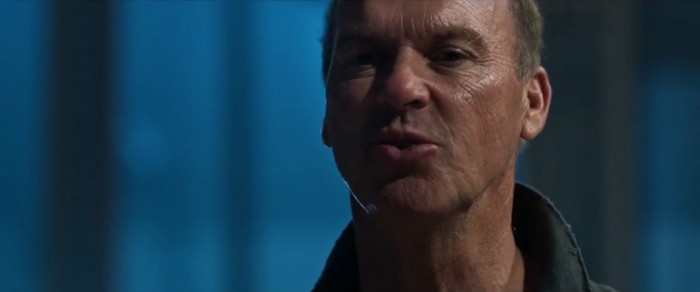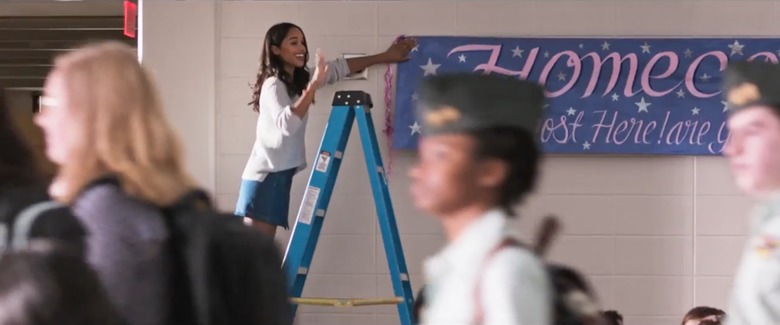'Spider-Man: Homecoming' Producer Amy Pascal Explains How Spider-Man Came Home To The MCU [Interview]
Amy Pascal is one of the most powerful women in Hollywood. The former head of Sony Pictures was instrumental in making the deal that returned Peter Parker to the Marvel Cinematic Universe. When I was on the set of Spider-Man: Homecoming, it seemed clear that her producer credit was not just a title – she was on set behind the monitor, playing a very active role in the creative decisions of the reboot.
But I was most surprised at how down-to-earth Pascal seemed, how honest some of her answers were and how self-deprecating she was about the previous Spider-Man installments (made under her leadership) that weren't considered home runs. She realizes that this current situation, where Sony and Disney get to "share" Spidey, rarely ever happens in Hollywood, and seems very grateful to have been part of orchestrating it.
How The Deal Was Made To Bring Spider-Man to the MCU
Question: Let's start at the beginning – How did Marvel and Sony come together to bring Spidey back to the MCU?Amy Pascal: We made five Spider-Man movies. And we needed to do something different. And we tried doing a lot of different things as you all know and documented. But the thing that we hadn't done was put him in the Marvel universe, and put him in a world where there are other superheroes. Because he was always the only superhero. And there's only so many times that you can tell the story of, "I really want everyone to love me, and if I tell them I'm Spider-Man, they'll love me...but I can't tell them!" So, there are, we tried, we've told that story as many ways as I could figure out.
And Kevin [Feige of Marvel Studios] and I had been working together since the very first movie because he used to get coffee for [previous Spider-Man producer Avi Arad], if you can believe it. He was very good at getting coffee, though. He's an even better producer, but he's also good at coffee. So it felt like we needed to do something else and this felt like the right thing to do. And Kevin and I had been talking for a very long time about that.
And here's the thing that I wanted, I emphasize for all of you because I think this is really important and I don't think it will ever happen again in the history of the movie business: you have three studios that came together to have this movie being made. And no studio likes to share anything with anyone, let alone three studios.
And truthfully – there is nothing cynical I can find in this statement – everybody did it because they wanted Spider-Man to be great. Truly, it was because Spider-Man is great, the character is great, and people love him. That's good for Disney. That's good for Marvel. And that is certainly good for Sony. So, the fact that all these companies were willing to work together to make that happen, to make, you know, believing that everybody needed each other in order to have that happen. I think that's pretty miraculous.
How Development Was Different
How did casting Tom [Holland] for this movie, with Marvel and Sony, differ from the previous times you were casting this character?
Well, there's more people. It was...it wasn't unsimilar because you're looking at a bunch of boys who are really hopeful and wanted desperately to be chosen, and you're whittling them down and whittling them down and feeling bad about it, trying to find some quality that you haven't seen before. We just did it together. It's been a miraculously smooth partnership between the studios.
Besides the fact that he is younger, can you compare this Spider-Man and Tom's performance to the others?
Well, I love all my Spider-Men. And they all have different qualities that I think are really special. The thing that they all are is that they're all fucking awesome actors. And each – whether it was Toby, or Andrew or Tom – they can act like crazy. And I think that's been a really important thing. I think youth was really important? We tried to find somebody who wasn't English, but, there you are...we wanted somebody who looked like Peter Parker. And somebody who we'd have empathy for. And who was trying really hard.
Can you think of any specific ways that the development of this film with Marvel was different from doing it independently at Sony?
Oh my God, they have a whole process that's so fantastic. I'm a total Marvel groupie now. They are meticulous, they are relentless and one of the great things – I say this all the time – is you're in a meeting with them, and they go, "Okay, it's good – but how do we make it better?" I've never heard that before! They're like, "How do you cut it?" That was like our line. So, this is like, "...okay. It's really good. How do we make it better than this? How do we go tot he next place? How do we bless it?" That's their favorite word at Marvel. "Are we blessing a scene?"
Was there a moment when you realized that the magic of the three studios was actually magic and not a disaster?
I think when we saw Tom, and it was unanimous from everybody that he had it, and everything fell into place. There was a...believe me, what we put the poor boy through hell. And a lot of other boys, too, who were also good. But once you saw that thing on film, just...everybody knew it. And you know, that's the magic. And the script's really good, and the dailies are really good, so so far everyone's happy.
The Future Of Spider-Man
One of the things that nerds really care about is what happens with Spider-Man over time. What is the larger plan? Are there agreements? How many appearances can Spider-Man make over Marvel movies?
I think I'll answer it this way: I think we found the right formula and I think everybody is going to want the right thing to continue. And I think that there's a, as I said, there's a surprisingly generous and cooperative thing, and if it works for everybody, then it's going to work for everybody. The thing is – and I always felt this way – if you worry about the movie and you worry about the story, all the politics take care of themselves. They just do. Because when the movies work, there's enough for more than everybody. It's when you start making the other stuff first that you start to get in trouble.
You mentioned the animated Spider-Man films. Does anything in those films preclude inclusion in–
Nothing precludes anything. The sky is open right now. And I think that if we can keep this goodwill going, I think it's going to be good for the fans and good for the journalists and the nerds and good for the companies.
There's been a Venom movie in development?
There's a Venom movie in development.
You talked about the importance of working with Marvel. What's the decision not to work with Marvel on the animated thing?
They just weren't part of it. It was something we were doing with Phil Lord and Chris Miller, and it's a very different kind of take on it? It's another realm.
Directing the Civil War
What was it about Jon Watts that made him the right choice for you?
Well, I loved Cop Car, and so did Kevin. We both did. And one of the things I loved about Cop Car was that with very little money, he was able to tell a story through action. And there's a lot of directors who are very, you know, successful action directors, that don't always tell the story through action. And action having a beginning, middle and end. And that you don't have like, a movie, and then an action scene, and then a movie, and then an action scene...and what we saw in Jon was somebody who actually knew the whole thing. Plus the performances that he got from those little boys I thought was really something. Plus, he like, scared you and he made you feel hopeful, and he surprised you when that lady gets shot, and he did all the things with, like eight-thousand dollars that people can't do with eighty.
How important was it to get Tom into Civil War to introduce the character?
That was always the idea, from the very start. TFrom the very start, it was always about putting him in Civil War. And it was always about the suit...that's what the movie is always about.
Making Things Different
Did Michael Keaton take any convincing to come back to comic book kind of stuff? I know talks broke down at one point.
Are you kidding? Are you joking? He was the person that we wanted from the time that we knew we were doing this character and he took from the time he decided it to the time we closed the deal, yes.
You have such a deep rogue's gallery of villains–
Sometimes too many!
What's your opinion about recycling those villains, bringing somebody back?
Well, here's the thing: we've recycled a lot. Um, I think there are certain characters I don't think there's anything more to say about them right this minute? And also, you're not doing a story on this, but we're also doing this animated movie, and that has a lot of characters in it, too. Very different, because it's animated. But I think we have to try to be really fresh with it. I mean, I don't know how many more times we can do – at least for now – I don't know how many more times we can do the Green Goblin. I've certainly tried to do it fifty.
One of the things that stands out about the movie is that it's a different villain, there's no Daily Bugle, Peter's younger – everything is totally different from all five of those movies. Is that something you also all decided from the beginning?
From the very beginning. From the very beginning, the idea was to cast somebody who was a kid who had that kid sensibility, who you felt had the weight of the world on him and only a kid could feel like a kid. You know? No matter what. And that's what we wanted. We wanted to get that feeling this time. And we did from the very beginning want it to take place in high school. I mean, the other movies take place in high school, too, but not in the same way that we're doing it in this movie.
The Supporting Cast of Students
Can you talk about the choice for this film, surrounding Peter with this big supporting cast, as opposed to the other movies where it's usually just him and one other character?
Well, that was one of the points of putting him in the Marvel universe. He lives in a world where, you know, New York City, where you have the Avengers and the shiny tower and all the Gods...and he lives in Queens. You know? And he sort of lives off the scraps of what they're doing in Manhattan. And so the idea was to populate the movie with enough of both, but, also just about getting really good actors. You know? And our director came in and said, "I want the world to look like high school. I don't want it to look like a Hollywood high school movie. Because, we've all seen those. I want it to look like what a high school would look like today. With a lot of nerdy kids. Because it's a school for smart kids. You know, with their paints all up here. That really looks good." But, he wanted it to reflect the world that we live in, and I think that was something...and you know, he's like, younger than we are...well, maybe not like Kevin, he's like four. To me. And he said things like "cliques are not the same as they used to be," "you can't have the rich kid clique and this clique." Kids hang out in gangs. He brought a whole other modern sensibility to it that I think is really fresh.
I grew up in Queens, and this is the first Spider-Man movie where the faces in the hallway look like the faces in the hallway I grew up with. How important was it for you to break up that white mass of faces in the previous five films?
I don't want to sound like we were trying to be politically correct, because that would be a drag, but...it was really important. Because it's the world that we live in. And we don't live in that other world anymore. And we needed to catch up with the way the world really is and people who go to the movies and people want to see themselves and...it was too long. Too long. But, we did.
One of the things I noticed from the Comic-Con clip was that Michelle's relationship with Peter was really, really interesting. She was sort of like, picking on him – and then in high school, when you like someone, you sort of give them a hard time. Can you tell me about Michelle's relationship with him?
Well, Peter has lots of girls around him in this movie, and in this movie, the story is about him and Liz. But Michelle and Ned are like his two friends who are similar and come from similar backgrounds. But obviously, Zendaya is something great.
When we...actually, can I tell you something really embarrassing? When Kevin and I looked at her screen test...oh god, maybe I can't say this...we didn't know who she was! There was this girl, she was the most gorgeous thing I've ever seen and we were like looking at it and she was so fine and so smart and savvy and poised and she had no make-up on...and we just looked at it after we shot it and we were like, "She's really fine." And they were like, "She's really famous." But she's been blowing us away every day.
***
Please note: This interview has been edited down from a longer transcript and the questions have been rearranged for clarity.

